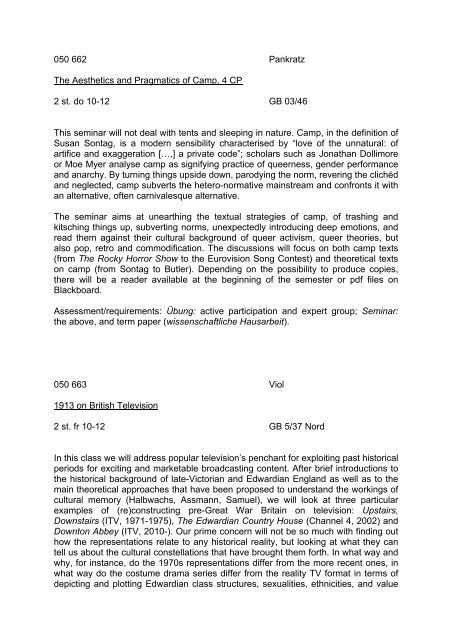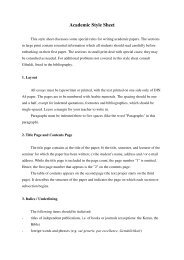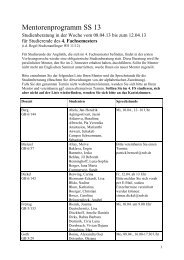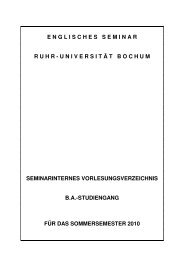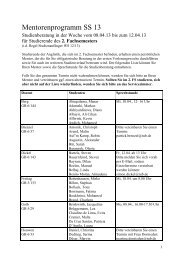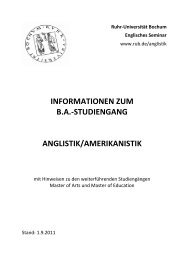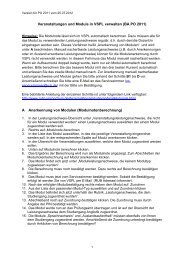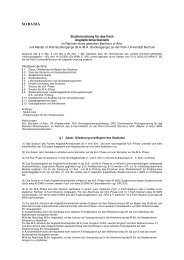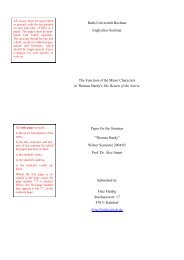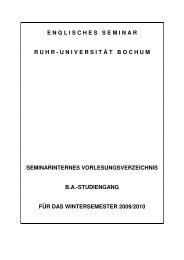gb - Englisches Seminar - Ruhr-Universität Bochum
gb - Englisches Seminar - Ruhr-Universität Bochum
gb - Englisches Seminar - Ruhr-Universität Bochum
Create successful ePaper yourself
Turn your PDF publications into a flip-book with our unique Google optimized e-Paper software.
050 662 Pankratz<br />
The Aesthetics and Pragmatics of Camp, 4 CP<br />
2 st. do 10-12 GB 03/46<br />
This seminar will not deal with tents and sleeping in nature. Camp, in the definition of<br />
Susan Sontag, is a modern sensibility characterised by “love of the unnatural: of<br />
artifice and exaggeration […,] a private code”; scholars such as Jonathan Dollimore<br />
or Moe Myer analyse camp as signifying practice of queerness, gender performance<br />
and anarchy. By turning things upside down, parodying the norm, revering the clichéd<br />
and neglected, camp subverts the hetero-normative mainstream and confronts it with<br />
an alternative, often carnivalesque alternative.<br />
The seminar aims at unearthing the textual strategies of camp, of trashing and<br />
kitsching things up, subverting norms, unexpectedly introducing deep emotions, and<br />
read them against their cultural background of queer activism, queer theories, but<br />
also pop, retro and commodification. The discussions will focus on both camp texts<br />
(from The Rocky Horror Show to the Eurovision Song Contest) and theoretical texts<br />
on camp (from Sontag to Butler). Depending on the possibility to produce copies,<br />
there will be a reader available at the beginning of the semester or pdf files on<br />
Blackboard.<br />
Assessment/requirements: Übung: active participation and expert group; <strong>Seminar</strong>:<br />
the above, and term paper (wissenschaftliche Hausarbeit).<br />
050 663 Viol<br />
1913 on British Television<br />
2 st. fr 10-12 GB 5/37 Nord<br />
In this class we will address popular television’s penchant for exploiting past historical<br />
periods for exciting and marketable broadcasting content. After brief introductions to<br />
the historical background of late-Victorian and Edwardian England as well as to the<br />
main theoretical approaches that have been proposed to understand the workings of<br />
cultural memory (Halbwachs, Assmann, Samuel), we will look at three particular<br />
examples of (re)constructing pre-Great War Britain on television: Upstairs,<br />
Downstairs (ITV, 1971-1975), The Edwardian Country House (Channel 4, 2002) and<br />
Downton Abbey (ITV, 2010-). Our prime concern will not be so much with finding out<br />
how the representations relate to any historical reality, but looking at what they can<br />
tell us about the cultural constellations that have brought them forth. In what way and<br />
why, for instance, do the 1970s representations differ from the more recent ones, in<br />
what way do the costume drama series differ from the reality TV format in terms of<br />
depicting and plotting Edwardian class structures, sexualities, ethnicities, and value


